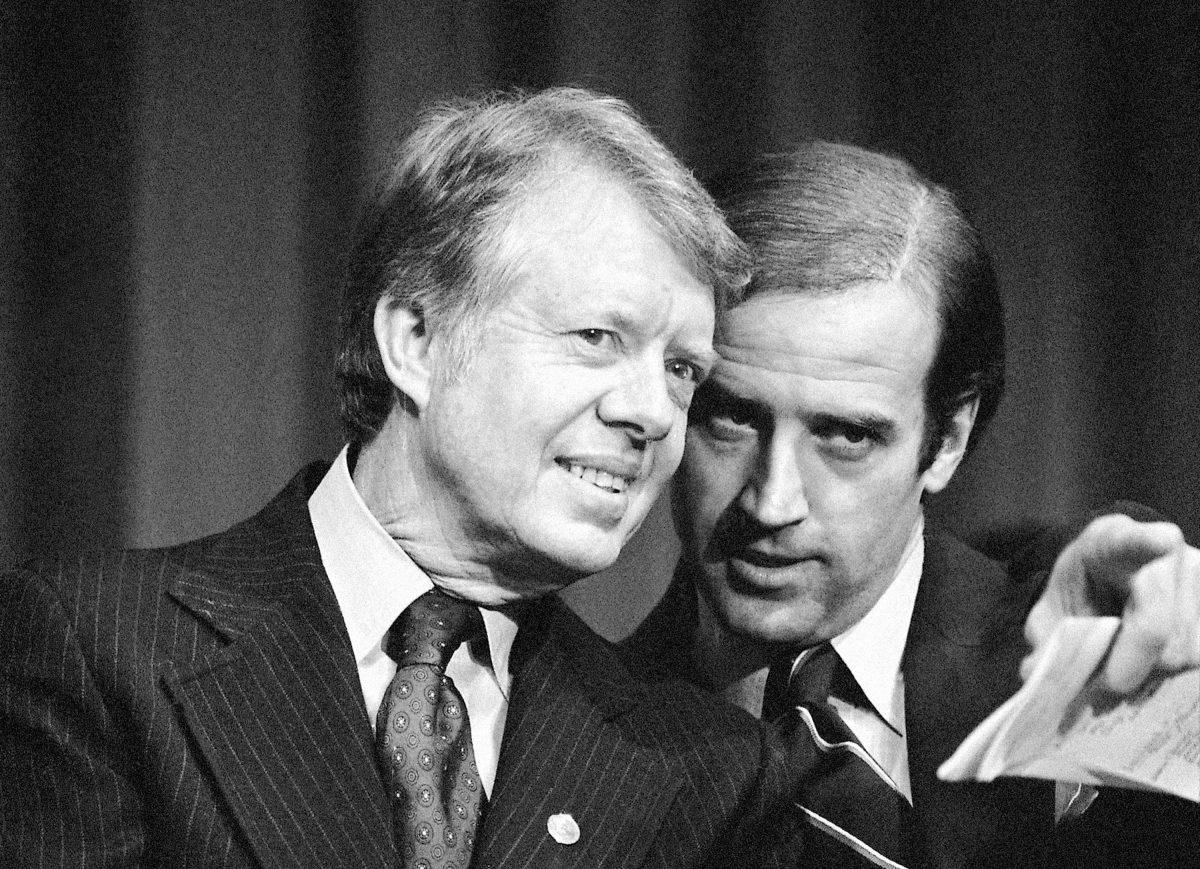Jimmy Carter, 39th President and Nobel Peace Prize Laureate, Passes Away at 100
Carter is remembered for his contributions to diplomacy, the ratification of the Panama Canal treaties, and his leadership during an era of economic turmoil.
Former President Jimmy Carter, who holds the record as the longest-living president in U.S. history, passed away at home, as confirmed by his family and the Carter Center on Sunday. He was 100 years old.
Carter, a Democrat, was president for one term from 1977 to 1981. He is widely recognized for his humanitarian efforts following his presidency, which included involvement with Habitat for Humanity and peace negotiations.
Known for his rapid ascent in national politics and his commitment to resolving global conflicts, Carter’s presidency represented a shift from the Watergate era to the rise of Reagan conservatism in the 1980s.
He managed significant transformations within the U.S. government amidst challenges such as high inflation, steep interest rates, unemployment, and international turmoil, particularly during the Iran hostage crisis.
As a former peanut farmer, he became one of only four U.S. presidents to be awarded the Nobel Peace Prize, recognized for his decades of efforts in advocating “peaceful solutions” to international issues and promoting human rights, democracy, and social and economic progress.
“The bond of our common humanity is stronger than the divisiveness of our fears and prejudices,” Carter declared during his acceptance speech in 2002.
“God grants us the ability to choose. We can opt to alleviate suffering. We can choose to collaborate for peace.”
Born James Earl Carter, Jr. on October 1, 1924, in the small agrarian town of Plains, Georgia, Carter was raised in nearby Archery by his father, James Earl Carter, Sr., a farmer and entrepreneur, and his mother, Lillian Gordy Carter, a registered nurse.
After completing his public education in Plains, Carter attended Georgia Southwestern College and the Georgia Institute of Technology before graduating with a science degree in 1946 from the Naval Academy in Annapolis, Maryland.
That same year, he wed Rosalynn Smith; their marriage lasted until her passing in 2023.
Carter joined the Navy, serving as a submariner in both the Atlantic and Pacific fleets, eventually attaining the rank of lieutenant.
He was selected by Admiral Hyman Rickover for the nuclear submarine program and subsequently assigned to Schenectady, New York.
Carter completed graduate studies at Union College in reactor technology and nuclear physics, a foundation that became crucial as he rose to become the senior officer of the pre-commissioning crew aboard the Seawolf, the second nuclear submarine.
He spent seven years in naval service before returning to Plains after his father succumbed to pancreatic cancer in 1953, taking over the family business, Carter Farms.
Alongside his wife, he operated Carter’s Warehouse, a farm supply and general seed company.
The couple had four children—sons John Williams Carter, James Earl Carter III, and Donnel Jeffery Carter; and daughter Amy Lynn Carter.
Beginning in Politics
The future president began his political journey on county boards overseeing education, the library, and the hospital authority prior to becoming a Georgia state senator in 1962.
He first attempted to win the governorship in 1966 but lost in the primaries to Ellis Arnall and Lester Maddox, eventually succeeding in the 1970 gubernatorial election.
As Georgia’s 76th governor, Carter declared in his inaugural speech that “the time for racial discrimination is over,” also highlighting ecological concerns and government efficiency.
The Democratic National Committee appointed him campaign chairman for the 1974 congressional and gubernatorial elections, during which Democrats reinforced their majorities in both the Senate and House of Representatives in the aftermath of the Watergate scandal.

Democrat presidential nominee Jimmy Carter raises hands with vice presidential nominee Walter Mondale (R) at the Democratic National Convention in New York City on July 15, 1976. Carter’s wife, Rosalynn, and their daughter Amy, wave beside them. Hulton Archive/Getty Images
He declared his candidacy for president on December 12, 1974, and was nominated on the first ballot at the 1976 Democratic National Convention, selecting former Senator Walter F. Mondale (D-Minn.) as his running mate.
Throughout the 1976 presidential campaign, he positioned himself as a reformer “untainted” by Washington politics, contrasting himself with former President Gerald Ford, who faced backlash for pardoning his predecessor amid the Watergate scandal.
Carter won the election with 50.1 percent of the vote, securing 297 electoral votes.
Mixed Presidency
During his presidency, he endeavored to tackle inflation and unemployment, boasting nearly eight million new jobs and a reduced budget deficit at the conclusion of his term.
Carter also saw the establishment of the Departments of Energy and Education and implemented new initiatives in both areas.
He signed the Alaska National Interest Lands Conservation Act, which effectively doubled the national park system and tripled the protected wilderness areas.
Two of his significant achievements were the Camp David Accords in 1978, fostering peace between Egypt and Israel, and the Panama Canal treaties in 1977, which set the stage for transferring control of the canal to Panama by 1999.
Carter established full diplomatic relations with the People’s Republic of China, continuing the efforts of his predecessors.
In 1979, he negotiated the SALT II treaty with the Soviet Union to limit nuclear weapons production.
However, his presidency faced challenges as the nation struggled with escalating energy prices, unemployment, unprecedented inflation, soaring interest rates, and complex international relations.
Efforts to combat rising inflation and interest rates led to a brief recession, further complicating Carter’s administration.

President Jimmy Carter listens to Sen. Joseph R. Biden (D-Del.), as they wait to speak at a fundraising reception at Padua Academy in Wilmington, on Feb. 20, 1978. Barry Thumma/AP Photo
He withdrew the SALT II treaty following the Soviet invasion of Afghanistan in 1979.
One of the pivotal crises that marked the end of Carter’s presidency was the Iran Hostage Crisis, which saw Iranian militants seize 52 American diplomats and citizens from the U.S. Embassy in Tehran.
This significant event dominated headlines throughout the final 14 months of his presidency. The hostages were released on the same day Carter departed from office.
Charity Work
Following his defeat in the 1980 election to Ronald Reagan, Carter established the Carter Center in 1982, aiming to facilitate conflict resolution, promote democracy, safeguard human rights, and combat disease globally.
Through the Carter Center, he engaged in mediating conflicts in various regions worldwide, including Ethiopia (1989), North Korea (1994), Liberia (1994), Haiti (1994), Sudan (1999), Uganda (1999), Venezuela (2002-2003), Colombia (2008), and the Middle East (2003-present).
In 2002, the Norwegian Nobel Committee awarded Carter the Nobel Peace Prize for his “decades of tireless work to find peaceful resolutions to international disputes, bolster democracy and human rights, and advance economic and social development.”
Carter and his wife participated in Habitat for Humanity projects for one week each year until 2020. Rosalynn Carter passed away in 2023 at the age of 96.
“Rosalynn was my equal partner in every endeavor. She provided me with insightful guidance and support whenever I needed it. As long as Rosalynn was alive, I always felt deeply loved and supported,” Carter said following her passing.
He entered hospice care on February 18, 2023, and remained there until his death.
The former president was diagnosed with skin cancer in 2015, which ultimately metastasized to his liver and brain; however, after treatment, the cancer went into remission.
He is survived by his four children, 11 grandchildren, and 14 great-grandchildren.
President Joe Biden accepted a request to deliver Carter’s eulogy following a visit to the former president during his hospice stay in 2023.


